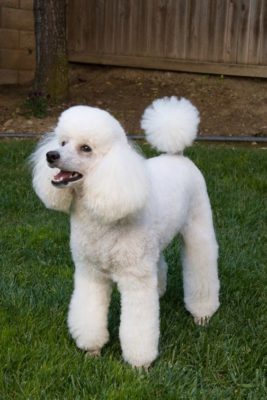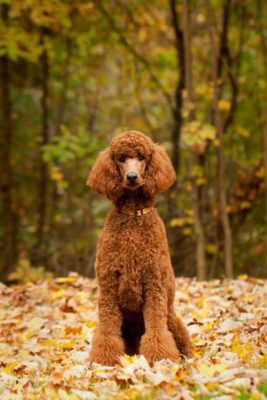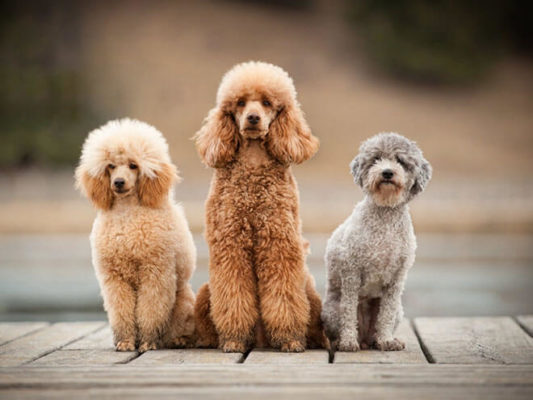Poodle
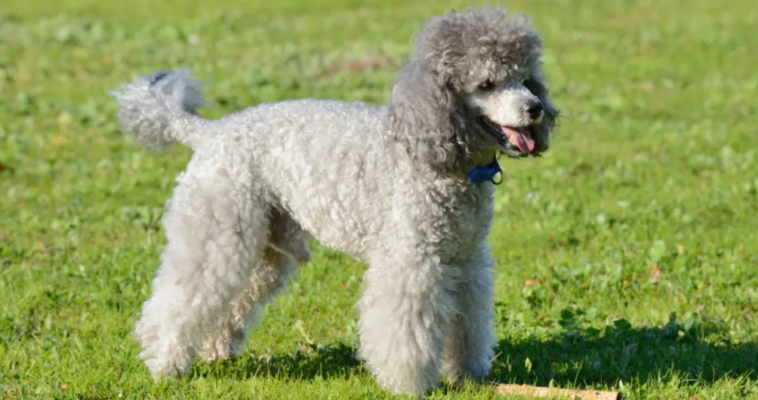
The Poodle is an energetic, cheerful, and very sociable dog. It needs constant attention from its owner, to whom it is very loyal. The pet loves to communicate with everyone around. The four-legged dog adores children, and he plays and coddles with them. She gets on well with other animals, easily finds a common language with them.
Table of Contents
Breed Information
| Another Name | Pudel (German), Caniche (French) |
| Origin | Germany or France |
| Height | 24-60 cm |
| Weight | 2-30 kg |
| Fur | Long |
| Color | Black, silver, brown, white, apricot or red |
| Lifespan | 12-15 years |
| FCI Classification | Companion and Toy Dogs |
| Group | Decorative dogs, dogs for children, dogs for the apartment |
| Price | $1000-1500 |
Breed Photos
Origin History
The Poodle first appeared in France back in the 16th century. Even then, there were several varieties of the breed, which differed in size. Poodles gradually gained popularity and, in the XVIII century, became one of the favorite breeds of the aristocracy. Dogs were kept at royal courts and were also used as acrobats in circuses.
In 1886, the first poodle standard appeared in Great Britain. Each country favored a different variation of the breed. In the dog’s homeland, the first club of poodle lovers opened only in 1923. The Fédération Cynologique Internationale approved the official standard of the breed 13 years later.
Appearance
Today there are four breed variations: Large (Royal), Small, Miniature (Dwarf), and Toy Poodles. It is a well-proportioned dog whose body length is greater than its height at the withers. It has a broad and deep chest. The pet’s waist is strong, and its abdomen is taut. The neck is strong, medium length, slightly curved. The head is elongated, proportional. The transition from the forehead to the rectangular muzzle of the dog is not very pronounced. The eyes are slightly oblique, dark brown. The ears are long, floppy, with thick fur.
The limbs of the Poodle are straight, muscular. The feet are small, oval. The tail is high pitched, thick at the base. It is trimmed to half or third of its length. The coat is curly, thick, and lush. Colors can be black, white, brown, gray, apricot, red.
Character
The Poodle is an energetic, cheerful, and very sociable dog. It needs constant attention from its owner, to whom it is very loyal. The pet loves to communicate with everyone around. The four-legged dog adores children, and he plays and coddles with them. She gets on well with other animals, easily finds a common language with them.
It is a very kind dog, which is not characterized by anger and aggression. The attitude to strangers depends on the upbringing and the person himself. A representative of this breed will not become a guard.
Care
The fluffy companion can easily be kept in an apartment. You should not forget to walk the agile dog in the fresh air. It should be at least three times a day. Comb the thick coat of the Poodle daily with a massage brush. You can bathe the dog 1-2 times a month. Your pet should be given a haircut at least once every three months. Also, inspect the floppy ears and clean them in time.
Training
The Poodle is an intelligent and obedient dog that always obeys its owner. Therefore, there should be no problems with its training. The pet quickly picks up commands and always tries to please the owner.
Yelling at the Poodle for doing it wrong is by no means recommended. Once again, show patience and praise your pet for correctness; reward it with a yummy treat. Dogs of this breed are very energetic and need regular walks and physical activity.
Common Diseases
The Poodle is naturally a healthy and strong dog with good longevity. However, the breed is characterized by the following diseases:
- Addison’s disease;
- bloating of the abdomen;
- optic nerve hypoplasia;
- retinal atrophy;
- cushing;
- chronic active hepatitis;
- hypothyroidism;
- deafness.
Pay special attention to the health of your dog’s eyes and ears. Take your dog to the vet regularly so that existing ailments can be diagnosed and treated. If hepatitis affects the Poodle’s liver, unfortunately, there is no cure. You can only stop the progression of the disease.
Nutrition
Poodles are not fussy about food. They can eat both dry food and natural food. If you choose the second option, make sure your pet’s diet is balanced. A third of it should consist of meat, preferably beef, and chicken or beef liver.
A source of carbohydrates would be porridges such as rice, oatmeal, buckwheat, millet. Sometimes you can give your pet eggs, cottage cheese, and pasta. Remember to give your dog fruits and vegetables so that his body is not deficient in minerals and vitamins.
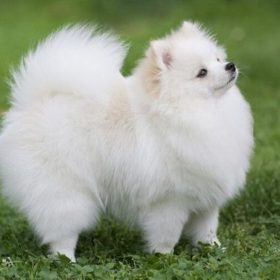 Pomeranian
Pomeranian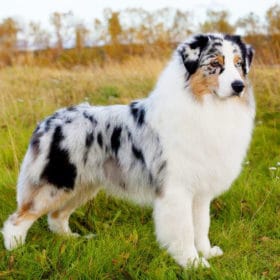 Australian Shepherd (Aussie)
Australian Shepherd (Aussie)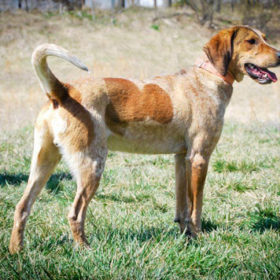 American English Coonhound
American English Coonhound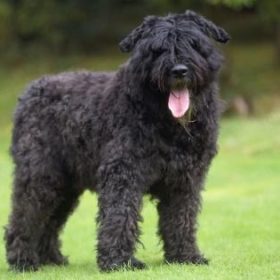 Bouvier des Flandres
Bouvier des Flandres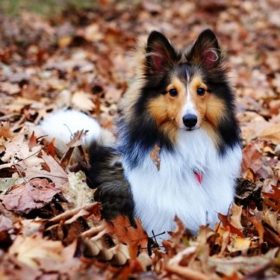 Shetland Sheepdog
Shetland Sheepdog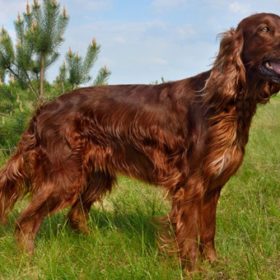 Irish Setter
Irish Setter